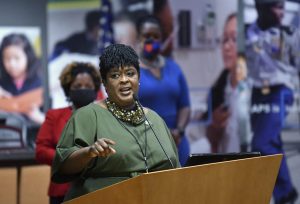This is an opinion column.
The 2024 Legislative Session was supposed to be the year lawmakers legalized gambling in Alabama.
The year it cracked down on election fraud — real or imagined.
The year it went to war over library books.
And if time permitted, the year Alabama outlawed lab-grown meat.
But now lawmakers have something new on their doorstep.
Because the Alabama Supreme Court, in a decision late Friday, ruled that frozen embryos — which it calls “extrauterine children” — are people, too, and the decision potentially ends popular fertility treatments in Alabama.
Alabama is now so pro-life that eager, anxious would-be parents might not be able to have babies.
Can’t get much more pro-life than that.
The court’s ruling follows a wrongful death lawsuit in Mobile. The plaintiffs had stored their unused frozen embryos at the Mobile Infirmary Medical Center, where a wandering patient meddled with them and dropped them on the floor. The embryos thawed, rendering them useless — dead, in the Alabama Supreme Court’s language — and the plaintiffs sued.
A lower court ruled that Alabama’s Wrongful Death of a Minor Act did not apply, but the state Supreme Court overturned that with an 8-to-1 decision.
For most folks, it’s pretty obvious that an embryo smaller than the period at the end of this sentence is not a person, but the Alabama Supreme Court now says that it is, and there’s no telling where that leads.
“The parties to these cases have raised many difficult questions,” Justice Jay Mitchell wrote, “including ones about the ethical status of extrauterine children, the application of the 14th Amendment to the United States Constitution to such children, and the public-policy implications of treating extrauterine children as human beings.”
Difficult questions, indeed. Unfortunately, Justice Mitchell didn’t answer any of them. Instead, he passed the buck, back to lawmakers, saying the law says what it says.
“But the Court today need not address these questions because, as explained below, the relevant statutory text is clear: the Wrongful Death of a Minor Act applies on its face to all unborn children, without limitation,” Mitchell wrote.
It’s pretty clear why Mitchell and his cohort on the court wouldn’t want to answer such questions. Because they don’t have any answers. Not good ones, anyway.
But let’s consider a few.
When a couple has a child after IVF treatments and discards their leftover embryos, are they then guilty of mass murder? What about the clinic staff?
Are hopeful parents seeking such treatments on the hook to keep their unused frozen embryos forever?
What happens if they can’t pay the thousands of dollars a year it costs to keep them frozen? Is the clinic responsible? Because we already know the state isn’t going to cough up the cash. Who pays when mom and dad are gone?
Or lawmakers who’ve used these procedures to have families — are they killers?
But the biggest and most immediate question is whether fertility clinics can continue to operate in Alabama.
When we answer that one, we can move on to how we attract or retain talented workers to live in such a state.
Alabama Chief Justice Tom Parker was more effusive than his colleague Mitchell, his words all but jumping off the page in a concurring opinion. In a theocratic screed, he referenced God, the Bible, Augustine and Thomas Aquinas. Less, so the separation of church and state.
I’m not being unfair in saying Parker based his decision on theology. He says so himself.
He writes, “In summary, the theologically based view of the sanctity of life adopted by the People of Alabama encompasses the following: (1) God made every person in His image; (2) each person therefore has a value that far exceeds the ability of human beings to calculate; and (3) human life cannot be wrongfully destroyed without incurring the wrath of a holy God, who views the destruction of His image as an affront to Himself.”
Wrath of God, huh?
Wrath is coming, but not from God. Not directly, at least.
Because a day is coming soon — perhaps today — when a woman will be told she can’t be a mother because she lives in the wrong state.
A man will be told that if he wants to be a father, he and his partner will have to cross state lines.
They’ll be told that to be parents, they’ll have to do it somewhere else — not Alabama.
And when that happens, they’ll turn to their lawmakers and ask them why.
Perhaps, like Parker, they can mutter some drivel about the wrath of God.
God help them, if they do.
Unlike Justice Mitchell — they had better be ready to answer.
Or better: Fix this.











